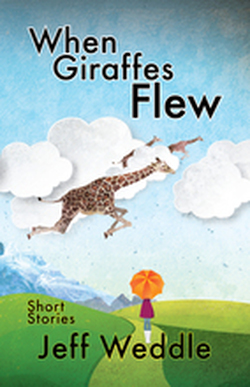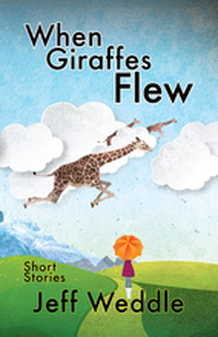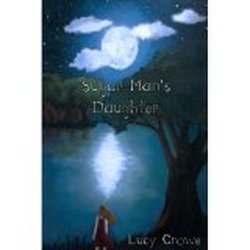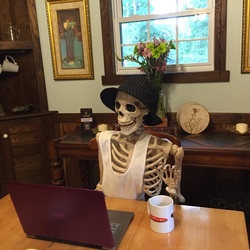Sacred Chickens
Menu
SACRED CHICKENS

WHEN GIRAFFES FLEW - by Jeff Weddle
Release Weekend! What readers are saying about Jeff Weddle’s When Giraffes Flew: "Jeff Weddle's stories are like the best of the Russian and Soviet absurdists. There is something about the inherent doom of life in each of these stories that is funny and terrifying. This is an excellent collection." -Andrew Hilbert, author of Death Thing “Sometimes funny, sometimes thoughtful, always unexpected. Jeff's stories take us by the hand and invite us to explore the dark shadows of the human soul. His characters live out our secret fears and inadequacies; his situations build with a jittery tension - reach the vertiginous tipping point - and go beyond into madness.” – Charlie Fish, editor, Fiction on the Web "I can count on one hand the slim volumes of collected short stories from contemporary masters I would gladly carry anywhere and everywhere to read again and again -- mostly for pleasure but also for education in the form. Mark Richard comes to mind, Amy Hempel, Denis Johnson, and Barry Hannah. With the release of When Giraffes Flew, I'm overawed and overjoyed to add my old friend Jeff Weddle to this august company. Jeff’s stories are always completely human, always revealing. With no excess of sentiment and no pandering to conventional morality, the reader is brought to care about the fate and the feelings of even the least savory of his many extraordinary down-and-outs." " --Mark Vanderpool, editor, Port Cities Review "Weddle's stories are dark gems. When cracked open they reveal the pathos of the twisted light that governs the strangeness of the human psyche."....".Weddle's dark entertainments celebrate the grotesque truths of the human experience through inventions that are both delightful and disturbing." – George Eklund, author of The Island Blade, poems, and In the Arms of the Fog, poems in Spanish and English. “I have been a fan of Jeff's writings for years. When he places you in first person settings, you live the experiences and it's like going for mental roller coaster rides through fantastic yet realistic adventures. Jeff's zest for life and cravings for living on the edge of the norm is brought out in his writings and when you are wrapped up in one of his stories, you too can become more than you would normally dare. The book should come with a warning label stating, ‘PLEASE HOLD ON TO THE BAR!’ You're going to really enjoy this one folks. Happy reading!” -- Michael Mann Order Below:
http://www.syppublishing.com/when-giraffes-flew/
http://www.amazon.com/When-Giraffes-Flew-Jeff-Weddle/dp/1940869609/ref=sr_1_1?ie=UTF8&qid=1446088190&sr=8-1&keyword
0 Comments
 When Giraffes Flew, by Jeff Weddle Review by Julie Carpenter This collection of beautifully crafted stories is as compelling as a novel and just as hard to put down. The stories are about the boundaries – sometimes self-imposed – that make us human, even in the face of possibility or hope or whimsical chance. Weddle’s writing exposes the raw materials that confine his characters to their poor choices and limited circumstances with breathtaking accuracy. The power of the writing is demonstrated in the sympathy produced by following the trajectories of the stories to their surprising but somehow inevitable conclusions. Each story is well-crafted but I especially like some of his ventures off the beaten path and into the inexplicable. A Simple Enquiry, She Finds Herself Dancing, An Ugly Monkey, Swarm, and, of course, the title story When Giraffes Flew, are all innovative in subject matter and writing style. But in all the narratives, immediate actions and sensations outline inescapable choices and the consequences that follow with the detailed eye of poetry – only what is necessary is present. This matter of fact style makes the more surreal stories feel completely plausible. Weddle’s characters, as humans do, accept the lot that is given them and make the choices they have to make. In Running With the Dogs, for instance, the protagonist finds that stealing a car leaves him with an odd moral dilemma. He doesn’t spend too much time questioning the universe…he simply makes his choice. In several of the stories, Jeanie Leanie Shoots the Sewers, and Hot Sardines, for example, the characters play off each other, each decision rippling out and pulling another character into dilemmas they must react to without fully understanding. Weddle accomplishes this without unnecessary complexity or drama and makes the web of consequences seem real. All of the stories invite multiple readings with close attention to detail, yielding, like poetry, more meaning as time goes by. The beauty of the prose and the quirky cover art should probably convince you to order the book for your shelf instead of just owning the kindle edition. Order here from Poetic Justice Books and Arts 
Sugar Man’s Daughter – by Lucy Crowe
Review by Julie Carpenter Sugar Man’s Daughter is a compelling mixture of genres – a mystery/romance/ghost story - that recounts the story of a woman who returns to her home town and her father’s house to find them haunted by the past. The prose is lucid and dreamy and slides easily between the realities of the main characters’ lives and the hauntings that emanate from Nicola’s mind and color her world. Nicola Thomas has returned to her hometown after her father’s suicide and a failed romance to live in the home she shared with him throughout her childhood. The house is haunted both by his presence the presence of a shadow that has pursued and threatened Nicola for most of her life. Her life is further complicated by her abusive ex and a stranger named Santangelo, a handsome but mysterious man with a quick temper who seems to be unable to deny his attraction for her. The plot moves steadily, pulling the reader along as the dark forces in Nicola’s life bear down on her. The threads of the story that first seem so disparate are pulled together in a rich tapestry, illustrating how the history of each character intertwines with and compels the others. Nicola steadily inches her way through the dark shadows of her past even when it’s clear that going forward will cause her tremendous pain. She must wade back through the past, her abandonment by her mother, some old friendships that must be questioned, and the strange presence that seems to linger in her house. She must also deal with her compelling attraction to Santangelo and the strange connection she feels to a teenage drug addict who lives in the town. The characters are memorable and well drawn. Their actions are understandable and sympathetic even when they are compelled by flaws and past mistakes. Even characters the reader might expect to be one dimensional are made human and sympathetic. Because the characters are complicated and real the book is never predictable. The suspense is sustained throughout the story, until the very end. I recommend this book but be warned: Give yourself some time. When you start it, you will have a hard time putting it down. Link to order below:
http://www.amazon.com/Sugar-Mans-Daughter-Lucy-Crowe-ebook/dp/B00FGBYS9C/ref=sr_1_fkmr0_1?ie=UTF8
 Fear and Nostalgia Uncle Morty is writing another post today. Please remember: he’s dead. He rambles. It can’t be helped. He’s also morbid and melancholy – which his doctor says is normal for a person in his condition. His topic today is Fear and Nostalgia. Here begins the blog post of Uncle Morty: (by Uncle Morty) Now that I’m dead, I note something interesting about flesh - skin and bones and nerves and meat, all connected, indissoluble - that something is FEAR. I’m not talking about the delicious kind of fear with which we tease our bodies by riding roller coasters or seeing movies starring some of my friends. I’m talking about the underlying bodily fear that dogs our every move (when we’re alive – really there are some advantages to being on my side of the question). The flesh filters reality through a rippling net of emotion and never stops to consider the subjectivity of its interface. One such emotion underlies all flesh at every moment: fear. Flesh is conditioned to provide for its own survival. To this end flesh interjects the fear of dissolution into every experience, though it may be mixed with joy, excitement, sorrow or any number of other emotions, perhaps even enhancing them with its sharp spice. Many humans live lives of courage and honor in spite of it. In fact, one might posit that bravery could not exist without fear. But until the last nerve quivers to a final halt, you will never understand this most basic of human emotions…the underlying filter…the need for safety that helps you make every decision, illuminating life in sharp relief, light and shadow. It’s only after the clarity of death that you can see the pervasive nature of this pressing emotion. And this basic fact of human nature, if unacknowledged, leads down strange pathways in search of safety. A grave danger to modern culture is the steady and hypnotic attraction of nostalgia. I see people speak in glowing terms of their own childhoods as golden ages of peace and superior child raising techniques. People speak of eras dead and gone as times of peace and prosperity, reaching heights of spirituality and manners – even when those times included the subjection of whole segments of the population as slaves or second class citizens or considered half the population to be property. Oh yes…your Puritans were pretty in the Thanksgiving pictures in your school books, but where are the pictures of them whipping the Quakers out of town? Burning down the villages of the indigenous people? These actions, at the time, were largely due to fear, perhaps self-induced by grasping for an unknown afterlife that poisoned the immanent. And fear hardens into hatred. (It's a terrible thing to sacrifice the present to the future. But that is a topic for another time.) I’ve lived a long time, and I can tell you that the golden age is always beyond grasp…either in the past or the future. The golden past doesn't shine in the light of present. I would disabuse you of your fantastic notions that some point on the space/time continuum there existed a refuge from trouble. While a madness for the future is the purview of the radical, the mad optimists, those who rush past the present moment unheeding, trying to outrun and ignore the needs of the flesh, the past is the territory of the fearful, those who would protect themselves at all costs. The past is safe because it's over. The children who tormented you have gone away. Your father – whose belt tore your flesh and left scars on your body and your mind – is gone. You may now well sympathize with his bewilderment, his inability to control life and the fear for his own flesh and the issue of his flesh, the terror and inadequacy against the crush of life that pressed him into punishment, into making the world small, wrapped in a cloak of anger he prayed would offer protection against all he feared. The times you feared you couldn't afford food or shelter have left your memory. The times your parents had those fears, may never have reached your level of consciousness. Remember, there was much to fear in the past. Mistakes were made. Events could have gone very differently. That night you drove your car through the neighbor's fence because you were tired and you’d been up all night at a party? You could have killed someone, including you, by the grace of God or random chance, those mistakes left you standing. However it happened, the past has been lived through. It is now impermeable, a fortress of concrete and steel that cannot be assailed by the winds of change. Those fears and regrets are dead, having been swallowed in the river of time. How many dystopias have been created, not by the breaking down of walls of the present to let the future flood in, but by trying to retreat into a past that never was? Unfortunately pipe dreams of former times are more like a pipe bomb when tossed into the present. The past was once the present, rife with choices and possibilities, with more horror and happiness than any one person could experience. If you were transported to the past on the timeline and allowed to experience it again, the same fear would grip you; the same choices would have to be made. There is no escape from fear only ways to avoid looking at it for a few moments. Indulge in nostalgia occasionally but don't try to drag the past into the present. The Book of David - author anonymous
Consider what your life would be like if you had to keep a huge part of yourself hidden and locked away because you are afraid what would happen if other people found out your secret. Well, consider this: is your personal happiness worth keeping this secret bottled up inside? Is it really as important as you think it is? The Book of David is one of the best novels that I have recently read. It is written in a diary format, and the diarists name is kept secret. Despite that, we learn a great deal about this character. He seems to have the, “Perfect,” life: numerous football scholarships, a varsity cheerleader girlfriend, a best friend named Tyler who he clowns around with, and a very religious family. However, he is still dissatisfied with himself because of his gargantuan secret: he is gay. This isn’t apparent at first; however, he soon realizes this fact when a new guy named Jon seats himself in his English class one morning. Jon rouses feeling a desire and love in the diarist, which he at first denies and tries to oppress. But he finds an outlet: his English teacher requires his class to keep a diary, which he pours his inner turmoil into. In doing so, he records the process of discovering himself. In all the heartbreaking, funny, and extremely sweet scenes in between, the readers find themselves in the midst of a great novel. I think that the format of this novel is very interesting as well. For the first couple of paragraphs, it was torture for me to not know the characters’ name. I really wanted to know. But then I realized that the author did not reveal the name for a number of reasons, namely to showcase that not just one person has this experience; many do. This is very important to realize, because it gives you a different perspective on the novel. To think that an unknown number of teenagers experience this kind of turmoil simply because they have found another facet of themselves and their personality is extremely sad to me. Finally, no matter what your beliefs this particular topic, it’s always important to become involved in another person’s story. Never discard a book because of the way you feel about a certain issue; it is always important to read about things that we feel strongly about, especially if they showcase an opinion that is different from yours. I say that this is important because exposing yourself to different opinions new thoughts and ideas just might make you feel differently that subject matter. Never walk around with blinders on. |

Click Photo above to buy ebook or paperback from Amazon.
Here's the link to Barnes and Noble Or order through your favorite independent bookstore! Categories
All
|
 RSS Feed
RSS Feed